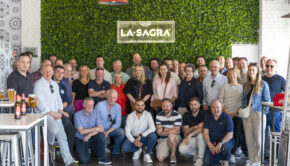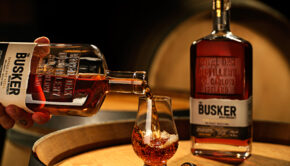THE FUTURE OF THE DUBLIN PUB

Over 200 attended an LVA seminar on The Future of the Dublin pub held in the Morrisson Hotel. Drinks Industry Ireland reports.
11 December 2013

Over 200 Dublin publicans and suppliers attended ‘The Future of the Dublin Pub’, the fourth in a series of seminars specially put on by the LVA.
First off was BWG Group’s Chief Executive Leo Crawford gave The Drinks Market from the retail perspective.
With alcohol forming one fifth – or €200 million – of BWG’s turnover symbol groups have increased in importance for the Group which now has over 300 off-licences and continues to grow the category “at your expense” thanks to the repeal of the Groceries Order.
Leo believed the abolition of the Groceries Order to be “a massive mistake” and he found it ironic that a former Minister for Health was the one who’d repealed it.
“The industry should be working to get the Groceries Order repealed,” he believed.
The shift from on-trade will continue, he said, but hopefully not as rapidly.
Retail grocery comparison
Some differences seem to have emerged between how the grocery sector responded to the economic crisis and how the on-trade responded.
Both had to cut back on costs.
After that, operational aspects such as margin management, shrinkage, hiring the best staff and stock control systems etc had to be looked at.
But during the worst recession Ireland has had in years BWG had decided to focus on the individuality of the retailer.
He challenged delegates to think – fairly or not – of the perceived image of the publican: “Normally dour, ageing, grumpy and gruff who tends to charge high prices….”.
Instead, the publican should be portrayed as supporting and sponsoring the local community, an Irish familiy business, part of the fabric of Irish society, entrepreneurs “who’re still here, still surviving and still offering employment, a fantastic product, a service and a great experience”.
He gave the country’s publicans but two out of 10 in terms of successfully publicising this aspect of their image.
Supplier collaboration
He emphasised the importance too of good collaboration between supplier and retailer.
“When our retailers are under pressure, they demand that someone come and see them to help solve their problems,” he claimed, “This doesn’t happen in the drinks industry.
“Publicans love to do individual deals with suppliers and you play right into their hands through this. Publicans should come together and work from the prism of the pub and not from the prism of the brand.”
And he believed that ‘support’ did not simply mean supplier’s bunting in the pub.
Eye-level….
The publican should be capitalising on what’s being displayed in a premises a lot more than he does, he advised.
Tesco charges the supplier for eye-level display, he pointed out. This should also be the case for drinks industry suppliers, but pubs were not doing this.
“When I go into pubs I don’t see the offers, the wines for sale, the great food offering, the great coffee on offer,” he said, “In our business coffee sales have grown to the point where we sell €25 million-worth of coffee at retail level.
“It’s worthwhile investing in a barrista machine. It gives good returns. In fact this is now essential and represents a massive opportunity.”
There were ‘Seven Deadly Sins of Retailing’ for the pub:
1. Rude or unfriendly bar staff
2. Dirty toilets
3. Cheap wne glasses
4. Female-unfriendly outlets
5. Lack of theatre
6. Lack of atmosphere
7. Lack of a food offering (not as bad as a poor food offering which does more damage).
“You need to sweat the asset a bit better,” he advised.
Understanding the customer
“Do you know your cusotmers?” he asked, “How are they segmented by age, business etc? You should similarly work with your customers on a focus group basis.”
He advised delegates to think more like a retailer, improve their image and challenge suppliers more.
“You face huge competition from the local restaurant, supermarket, convenience store, the gym and the couch at home. The challenge is how to get these people into the pub.”
Kay McCarthy, Founder and Head of MCCP, The Planning Agency spoke about Pub Customers – How They’re Changing
Kay has worked on such brands as Jameson, Coors Light, Ketel 1 vodka and Red Bull in her time.
Her job is to understand human behaviour and translate it to business advantage for her clients.
“If you stand for something different, your customers will come,” she told delegates.
Some 852,000 people live in Dublin of which 135, 800 drink out of home on a weekly basis she pointed out – and Dublin publicans are fighting to up the latter figure.
She also warned that some forms of research can be deceptive, especially when it comes to ‘heart’ versus ‘brain’. Figures had indicated that some 56.3% really enjoyed a night in a pub (heart) but in reality only 29% actually went out to the pub (brain).
“Cusomers tell us they’re sick of drinking wine at home and want something different. You must provide that experience for them in the pub. It’s not simply about ‘transactions’.”
Food and/or alcohol
The future of the pub is about diversifiction, she told delegates. Consumers want escape, new expriences, fun and ‘community’.
While surveys had found that 50% of people have just €100 a month to spend, it was equally true that 27% had moe than €100 to spend.
Winning ‘share of wallet’ means ‘disruptive thinking’ as the competition is not the pub next door but netflix, multiples cinemas etc she pointed out – ‘Video on Demand’ grew by 35% Year-To-July 13th.
“The consumer is redefining the pub so do not assume that the customer has stayed the same.”
5 ‘dos’
1. Do redefine the pub by considering what you’re actually selling to attract the customer with new needs.
2 Do make yourself famous for something and do it really well. Don’t get caught in the middle.
3 Do reward customers by makeng their time out a fun, quality experience. Make it more about the atmosphere.
4 Do interact with digital media to enchance your offer.
5 Do rememer that the pub remains one of the orignal communtiy hubs, so have a full Day-Part offering.
John Doody of Deloitte brought delegates up-to-date on Pubs & Banks – Where to now?
He wanted to get across to the seminar how pubs should manage their debts more proactively.
“We’re five years into the banking crisis and still most businesses need to be more proactive in managing their relationship with banks,” he believed.
Banking had now gone into its ‘post-crisis’ phase, he explained.
“The banks have now become focused on the liability side of their own balance sheet. There’s no access to cheap readily-available cash today. Therefore it’s liability-led — and they’re selective about who they lend money to.
They’re now looking at the cashflow the business generates, how much the debt can be serviced and repaid.”
Capital allowances had now been rescinded, he added, pointing out that the licensed trade sector is currently overleveraged which will take a long time to unravel.
Resturctuing strategies
For pubs in a stressed position wth their banks, the preferred route – from the point-of-view of banks – is a restructuring of debt rather than Receiverships.
“They don’t expect to get all their money back in a severly overleveraged business,” he said, “But they want as much as possible back.
“The borrower will also need to consider non-core assets in negotiations with the bank.”
Whatever’s agreed, he added, the borrower must be able to deilver on that.
Otherwise it damages credibility and makes the second restructuring more in the banks’ favour.
Paul Nolan, Co-Owner of Raglan Road Pub & Restaurant in Florida gave the US hospitality view in Designing The Future
As part-owner of the Raglan Road Irish Pub & Restaurant in Florida, he’s well aware of global trends.
Whether these global trends begin in the US or the UK, he assured delegates that all such trends tend to come over here eventually.
The pub, with access to 40 million tourists a year coming to Disneyland, has 550 seats taking 1,000 covers a day and offers contemporary food.
90% of the pub’s customers are Americans who’re also demanding and don’t take poor service or quality lightly.
The family is important in Raglan Road so it gives children food that tastes great while ensuring that their parents know it’s of good quality.
“We work hard at the Day-Part to get families in earlier in the evening in order to have an older clientele by 8.30pm,” he explained, “Later on in the evening, the clientele tends to comprise younger adults.”
Food
“It’s not about corned beef and cabbage and stodgy food,” he pointed out, “Irish food is different today.”
Kevin Dundon of Dunbrody House works with the pub which works really hard to find the best fish; more importantly it tells its customers how hard it works in doing this.
“We also tell a story with the food offering about its provenance,” he added.
Some 220 people work at the pub which has gone from being one of the smallest-performing restaurants on the Disney estate “to nearly the top-performing one”.

Paul Nolan – “It’s not about corned beef and cabbage and stodgy food. Irish food is different today.”
Staff
It’s essential to spend a lot of time with the bar staff as it pays back enormously, he stated. Bartenders drive businss and need to know more about beer, spirits and wine than anyone else in the operation. They must know about the product they’re selling: how Guinness is brewed, where that Reisling comes from etc.
In the Raglan Road, barmen wear a shirt and tie coupled with a traditional waistcoat relfecting the time when service was a craft. It takes three weeks for a floor server to get trained to read a guest properly.
“If you work hard with your staff they will bring back the business in heaps,” he said.
Music
The pub carefully vets every single tune, putting them into categories to match the mood.
Don’t simply pump the radio through your pub; that shows you’re lazy, he explained.
“If you have your own soundtrack, your own playlist, it indicates that your pub has its own style and the customer might want to be part of it.”
Appropriate lighting also helps make the most of the Day-Part.
“We have an asset here in having Irish staff who can wipe the floor against any other nationality,” said Paul.
The Dublin pub has to look at the competition to the pub – Ryanair, IMAX, netflix, Starbucks for lunch, TGIF – and that competition is growing.
For the future he envisages less alcohol being consumed and more competition for the leisure €uro, the loss of the pub’s position as a social venue and the growth of food in pubs.
“If it happens in US it will happen here,” he assured delegates, “50% of Americans eat out daily and Ireland will follow this trend. There’s huge interest in food in the media and this offers the opportunity for a pub to be distinctive, exploiting the wave of demand for local produce and sustainable food.”
Should the LVA be talking to the culinary instutions, he wondered?
The offering
He believed that people will always look at a blackboard as it tends to indicate that you change the menu in some way every day – it’s what people are looking for.
Some pubs in the US go to great lengths in their food presentation.
One, for example, presents its full Irish breakfast in a heavy iron frying pan as the plate.
“In a natural way, this tells the customer that, ‘We’re doing something differnt here’.”
Placing bottles of Prosecco on the counter on a Sunday is also a good idea – “We’re sellling shedloads of it”.
Paul concluded by asking pubs to “get going with twitter/instagram”.
So many people now photograph their food and it was instant advertising.
“Show that you care about the food source,” he adivsed, adding that customers are getting bored with mainstream drinks so tell them what they should try next.
Prove to your customers that your staff knows more about coffee than they do, he advised.
Some families want to have a meal in the pub on a Sunday and want to carve the roast themselves. Facilitate them, he concluded.
Seáneen Sullivan, part-owner of L Mulligan Grocer, explained How We Build Our Busines.
In restoring an old abandoned pub the owners wanted to create a place where people would be happy to come, eat and/or have a drink.
It holds regular quzz nights, tastings etc as it wants to be part of the community in a way that’s not simply about locals coming in for a pint on a Saturday night.
“There’s no sustainability for us in that,” she observed, “Knowing what we’re not is just as important as knowing what we are.
“We decided that either we become redundant as a social space or we become more than just about drinking,” she explained.
For example people come to shop at L Mulligan Grocer, so it retails jams, breads etc.
It also offers its customers ‘growlers’ in which to take home its speciality beers.
“People talk about that a lot,” she said. What’s more, the pub sells small (baby Powers-sized) bottles of craft spirits for customers to take home and taste.
And it’s making much use of twitter and facebook as a way to engage customers when they’re not anywhere near the pub.
Lee Cash, the ‘ideas man’ behind the Peach Pubs concept in the UK told delegates about Building a Suburban Pub Business.
This group now consists of 16 unique and individually-designed pubs which believe in ‘dialogue’ with their customers through well-trained staff.
It’s not possible to do everything yourself, explained Lee, “Even as an owner who works ‘on-site’, some 70% of customers are going to be dealt with by someone else, so it’s important that that person knows what they’re doing”.
Peach Pubs uses the motto ‘Our house is your place’ to emhasise the homliness of its outlets.
LVA Chief Executive Donall O’Keefe summed up the seminar.
Dublin publicans must develop a culture of staff training again, “We can’t go through the next five or six years without investment,” he told delegates, adding,“But the need to figure out where your business is going is your responsibilty.”
One needs to ask, “What am I doing for my customers better than my competitor?”.
It’s necessary too to define your business.
Is your pub a Late Night Bar, a Food Pub or an Iconic Pub?
The industry will most likely shrink over time, he observed, but wines and food will remain a part of hospitality’s future.
But by-and-large, pubs are not great at these two items at present and it’s just as important to have a great coffee offering and run events that help the pub become part of the local community.
“We are inherently conservative,” he observed, “We hate change and we don’t like to learn, but change is coming and coming to the pub trade because the consumer is changing.
“Supplier competition in a declining market is good for us,” he said. Suppliers look to the brand but publicans must look to the channel, he said.
“Our weakness is in not promoting the channel.
“The challenge is how do we better position the on-trade with three particular audiences: our customers, politicians and the media?”
Donall remained convinced that there will be a vibrant pub trade in five years’ time.
“The trade has essentially been frozen over last five years. The next five years won’t be the same,” he concluded.




 Print
Print






Fans 0
Followers